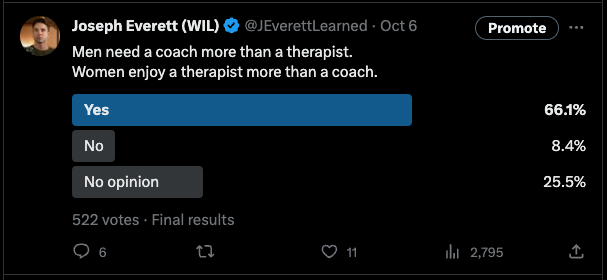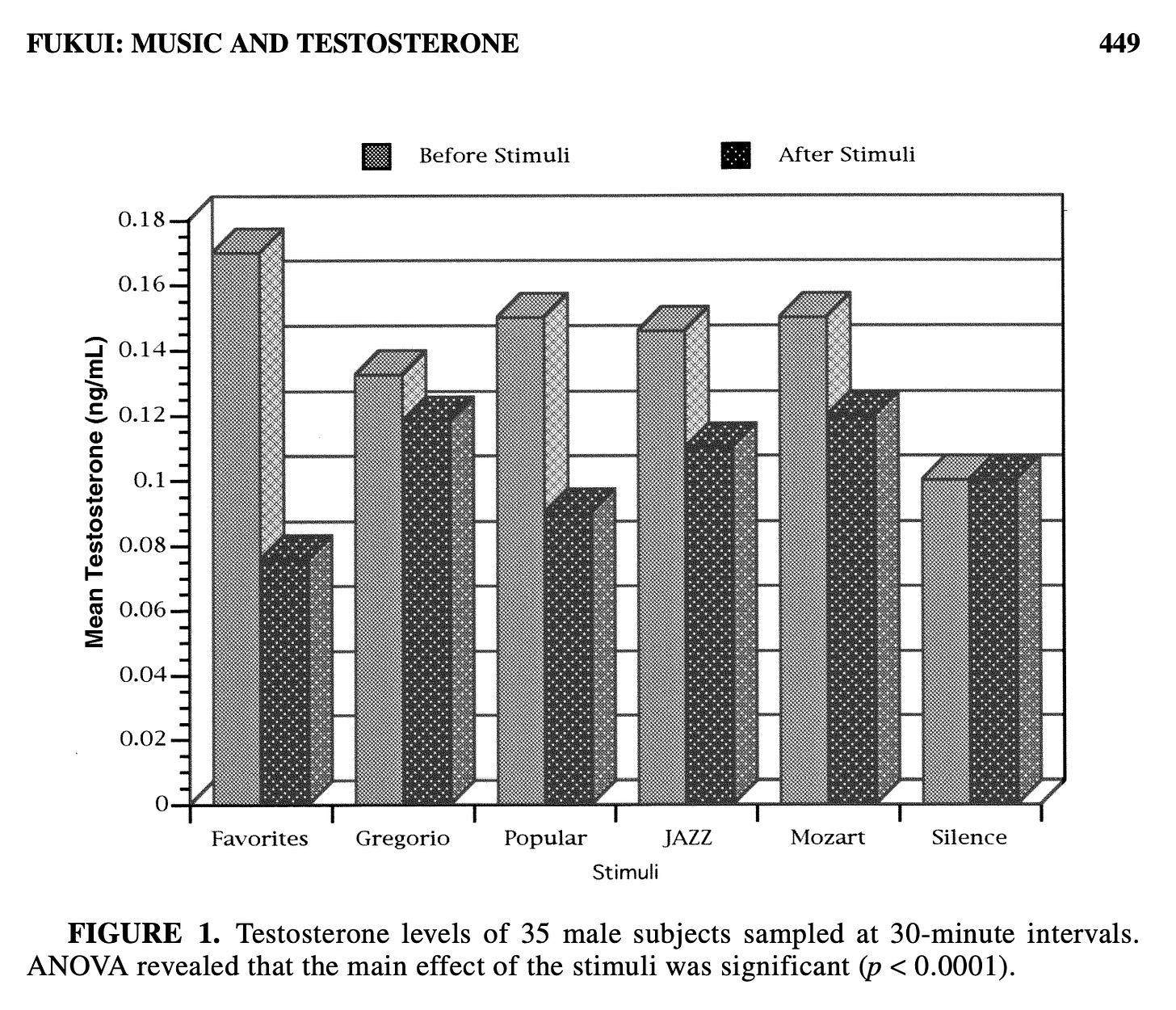Men Need more Testosterone, not more Therapy (Patreon)
Downloads
Content
 </figure>
</figure>I recently interviewed Brandon Carter, also known as “King Keto” on Instagram. Brandon is a multi-millionaire who runs multiple businesses, mainly in the fitness space. I was interested in Brandon because while he has indeed been on a ketogenic diet for 8 years, much of his online content doesn’t focus on keto itself - keto is just a tool for him to stay productive.
We touched briefly on the effect that his father’s suicide had on him. He mentioned this in a short clip from an Interview with Habitstack:
“My rock bottom was when my father committed suicide. I was early 20’s and I remember thinking ‘damn if I had been more serious about success and more serious about the acquisition of capital… I don’t know what the number is, but there is an amount of money that if I had it, I could have helped him’<figure>
… I said that to my therapist once, years ago and she said: ‘oh you can’t blame yourself for that.’
Shut yo broke ass up. So I stopped going to her.”[Brandon and the interviewer laugh]
“But it’s true.”
 </figure>
</figure>I’d argue that this is a very testosterone-driven thought process. That is, Brandon wanted to discuss the event in terms of a problem and the solution, but the therapist wanted to focus on Brandon’s emotions (like blame or guilt). Seeking out therapy after such an intense experience was of course a very wise move by Brandon. Though, I wouldn’t be surprised if many male patients encountered differences in perspective considering 74% of the members of the UK Council for Psychotherapy are female and 75% of the therapists in the United States are female.
As this paper explains, “females and males can use different hormonal and neural mechanisms to respond to the same emotional event.”
<figure> </figure>
</figure>Here’s what I’ll argue in this post:
・Based on the nature of testosterone, most men need a coach or mentor more than a therapist or shrink.
・Based on the nature of estrogen (and probably oxytocin), women may enjoy a therapist more than a coach or mentor.
Recently in another interview with Rachel Wilson, I brought up that there seems to be too many feminine solutions to masculine problems nowadays. Lately there’s a lot of talk about ‘emotional intelligence,’ expressing your emotions, getting in touch with your emotions, ‘processing emotions,’ being more ‘emotionally vulnerable,’ and so on. Further, this focusing on emotions is generally just assumed to be a good thing. Thanks to Carl Jung, we even have floating around in the Zeitgeist the assumption that integrating your ‘feminine side’ will make you a more complete man.
Stoic men used to be universally respected, but it appears that thanks to people like Sigmund Freud, more people are starting to view stoicism as some sort of pathological repressing of emotions. Freud argued that repressing emotions will punish you with mental repercussions later - something akin to how forgetting an entire raw chicken in the trunk of your car will inevitably punish you with a wretched stench right when you’re taking a woman out for a second date. That is, you better process your emotions or they’ll end up stinking up your mental space when you least expect it.
My journeys delving into the makeup of the mind via multiple ego death-inducing psychedelics and hundreds of hours of meditation led me to believe that most emotions are bullshit. That is, there are emotions that are effective in guiding you towards more meaningful connection with others and more satisfaction in life, and there are emotions that are not. In fact, many emotions are unwanted distractions. (Perhaps I’m not spiritual enough, though.)
<figure> </figure>
</figure>So because of the differences between men and women’s neurochemical makeup, I think we can make a good guess about what is going to put men on a more long-lasting path of satisfaction with life despite the inevitable stress that life will gift us:
・Men need someone wiser than them (in general or in a given domain) who can teach them set worthwhile goals and to chart out plans of action, as well offer insights into what that they may need to change about himself (unproductive behaviors, unproductive mindsets bad social skills etc).
・While it may make some men feel better in the short term, for the long term, they likely don’t need someone who is going to mainly talk about how they feel about their dissatisfying life.
*Men also need to sleep well, eat a nutrient-dense diet that won’t make them fat, go to the gym, avoid environmental toxins et cetera but that’s for another time.
 </figure>
</figure>Men have 8-15x the Testosterone of Women
I just finished reading Psychologist James McBride’s Heroes and Rogues and Lovers: Testosterone and Behavior.
Here are some of the things about testosterone I thought were interesting:
-Testosterone increases strength, energy, concentration, confidence, and mood in general. McBride’s testing of his own testosterone suggested that he had 30% higher testosterone when in an optimistic mood compared to a dejected mood. Measuring testosterone in a small sample of patients hospitalized after having made suicide attempts revealed their testosterone to be low.
-Testosterone is most sensitive to success and failure in dealing with other people.
-Testosterone is associated with persistence and an “intensity” or focus. Men tend to focus on one thing where women tend to pay attention to many things at once. “Studies show that men and animals who are high in testosterone persist at what they start, and they work longer at a task without being distracted.”
-Men higher in testosterone are less likely to marry and to be satisfied with marriage.
-Blue collar workers generally have higher testosterone than white collar workers.
-Men in general exchange less sentences (they talk less) than women. Men’s conversations center around action and activities. Men with higher testosterone smile less often. Men lower in testosterone are more willing to engage in small talk. Better verbal skills are associated with lower testosterone. Men are less expressive about their own feelings and less concerned with the feelings of others.
“Men tend to drop what appear to be strong loyalties when they change work assignments, jobs, or sports teams. Women maintain lasting relationships around their home communities.”
This is what a female-to-male sex-change patient in Holland had to say about taking testosterone: “Your use of language becomes less broad, more direct and concise. Your use of words changes, you become more concrete… I think less; I act faster, without thinking.” McBride argues that because our male ancestors focused on skills for hunting and fighting, a simple vocabulary was sufficient. McBride says women have better verbal skills. I would argue that’s probably because social bonding was more important to them.
<figure> </figure>
</figure>Note that:
・Men have 15 times the testosterone of women.
・Women have about 4 times the oxytocin of men.
・Women have 3-4x the estrogen (estradiol) of men.
According to Testosterone, oxytocin and co-operation: A hypothesis for the origin and function of music, oxytocin is involved in vocal processing in many animals including humans. Where testosterone does not correlate with social vocalizations, oxytocin does. Further, oxytocin correlates with maternal vocalizations and “motherese” (babytalk) i.e. ‘who’s my scoobywubby pumpkin scubby dooby doo? You are! You’re my gooby da booby scubby boobooroo dibby dabby pie!’ Put another way, oxytocin encourages the mother to speak gibberish to their children for the purpose of bonding. Some men high on oxytocin thanks to their new girlfriends may effect a high-pitched sing-songy voice when talking to their girlfriends over the phone.
In general, oxytocin encourages people to bond with people and bonding with people enhances oxytocin secretion.(S) We’ll get to estrogen in a moment, but I think overall the differences in the levels of testosterone, estrogen and oxytocin between men and women suggests:
・Women in general are more interested in communication for bonding; practical information gathering is a nice byproduct.
・Men in general are more interested in communication for acquiring useful information; bonding is a nice byproduct.
Women being excited about the bonding aspect more than the content of communication is what makes Patrice O’Neal’s bit on women being bad story tellers (to men) so funny.
“By a show of hands guys… how many of you - your woman tells wonderful stories?”(Audience erupts in laughter.)
Feminine solutions to Masculine problems
I’ve been really interested in the bidirectional nature of testosterone and behavior. That is, there is a lot of research showing that certain behaviors will increase testosterone and higher testosterone will make you more likely to engage in these kinds of behaviors. For example, research has found: men who win at competition experience an increase in testosterone. High-testosterone men are more likely to engage in competitions. Men who approach and speak to unfamiliar women experience and increase in testosterone. Men with higher testosterone are more propelled to speak to unfamiliar women.
This got me thinking about all kinds of behaviors. For example, do you think melancholy songs with a slow BPM and whiney lyrics about how the singer’s girlfriend dumped him would raise or lower your testosterone?
A 2018 study found that lower testosterone was associated with a preference for “sophisticated” music like classical or jazz. While low testosterone men simply happened to have a liking for sophisticated music, another study found that listening to Mozart or Jazz for 30 minutes lowered testosterone. Interestingly, popular music decreased testosterone even more. Unfortunately the genres they tested were limited, so we didn’t get to see if Mongolian death metal would raise testosterone.
<figure> </figure>
</figure>But the point is that all kinds of behaviors influence testosterone.
Note that:
・Men low in testosterone are likely to experience depressive symptoms.(S,S2) Many lines of research suggest testosterone is an anti-depressant.
・Women who experience lowered (or changes in) estrogen levels are more likely to develop depression.(S) Some research suggests estrogen itself is an anti-depressant.
Feminine Solutions
“You know Homer, when I found out about this, I went through a wide range of emotions. First I was nervous. Then anxious. Then weary. Then apprehensive. Then … kinda sleepy… then worried, and then concerned. But now I realized that being a space man is something that you have to do.” -The Simpsons Season 5, Episode 15
Andrew Huberman has said that where testosterone makes “effort feel good,” he’s described estrogen as “making emotions feel OK.”
Considering this and the bidirectional nature of testosterone and behaviors, men are likely to benefit more from effort than so-called emotional ‘processing,’ and women may benefit from bonding through discussing emotions more than men.
Let’s take a look at estrogen, oxytocin and emotions briefly so we can understand how men’s mental processes differ from women’s.
Rachel Wilson mentioned that her father spoke about how female teachers, female authority figures, his ex-wife et cetera often told him he was at fault for not being “emotional enough.” Essentially what that translates to is ‘you’re not female enough.’
As you may suspect, estrogen has a lot to do with emotions. One male to female transitioner taking estrogen said that estrogen allowed them “a greater depth of emotion.” A 1992 study suggests women are more attentive to emotions than men - they found that men were poor at recognizing unhappiness in women, where women were good at recognizing unhappiness in both sexes. According to Professor David M. Buss of Harvard, men are more jealous over sexual infidelity, and women are more jealous over emotional infidelity.
In general, estrogen affects how much the mind values emotions as a guide for selecting behaviors and how the mind interprets the environment. Estrogen makes people value their emotions more.(s)
Estrogen also has a lot to do with socialization and bonding. This paper explains that “estradiol (estrogen) functions as a central mediator of behaviors that are crucial components of social interactions.” Another 2020 paper exploring estrogen’s effect on behavior explains that higher estrogen encourages more intimacy seeking.
"This study is in agreement with research conducted on non-human primates, showing that fluctuations of ovarian hormones across the menstrual cycle influence a variety of social and cognitive behaviors."
In fact, estrogen has a potent modulating effect on oxytocin, the ‘social bonding’ hormone. “[The] unifying principal in oxytocin action in the brain is to facilitate social encounters by reducing the associated anxiety.”
On that note, MDMA is known to illicit an intense feeling of connection with the person(s) you are with while high on the drug. MDMA increases oxytocin to about four times that of baseline.
Lazarus and Folkman noted that women often employed “emotion-focused coping” and men often employed “problem-focused coping.” There was some dispute about whether this is consistent, but a 2002 meta-analysis by Tamres indeed found that: “women were more likely to use strategies that involved verbal expressions to others or the self—to seek emotional support, ruminate about problems, and use positive self-talk.”
Tamres conducted a follow-up study to delve more deeply into how men and women coped with either a) freshman year in college, or b) recovering from heart surgery. They found that problem-solving coping was the most common strategy for men. Seeking social support was the most common strategy that women used.(S)
“…women loved [Don Juan] not because he was handsome or clever but because he listened to them. While other men chased women and showed off for them, Don Juan paid attention to women and listened to what they had to say.” -James McBride
In fact, this focus on emotions for women tracks onto what Orion Taraban, Doctor of Psychology (Psy.D) and host of the PsycHacks youtube channel , says about women and apologizing. This is the second most popular video out of 747 videos on his channel and he explains that women (seem to) apologize less than men because they are concerned about the emotional state of the other person, where men will be concerned about the transgression that led to an emotional state. That is, a woman is more likely than a man to just do something nice to make the person feel better rather than apologize.
“From a man’s perspective, the problem is some behavior for which he believes the woman to be at fault. As a consequence of that behavior, he is now angry and upset. The behavior is the problem and the emotional response is the consequence. In his mind, the solution to this problem is acknowledgement of fault and behavioral change. …From a woman’s perspective the problem is not the identified behavior, the problem is that the man is angry and upset. … No harm, no foul. So it’s the harm, the anger, the upset that is the foul from this perspective. In her mind, the solution to this problem is changing the way he feels.”
The benefits of emotions, estrogen and bonding
As mentioned, women who experience lowered (or changes in) estrogen levels are more likely to develop depression.(S) Some research suggests estrogen itself is an anti-depressant. Further, this study explains that lower estrogen inclines women to be more susceptible to fear and anxiety.
In fact, there are tons of papers exploring why men are less susceptible to PTSD than women. It’s presumed that men’s testosterone has a protective effect, but estrogen also seems to be protective against PTSD. That is, women low in estrogen are more susceptible to experiencing trauma-induced fear and anxious intrusive thoughts.(S)
We know that oxytocin and estrogen reduce anxiety and negative mood and that oxytocin increases as a result of social interactions. While the behaviors that increase testosterone have been studied extensively, there’s not as much literature on how behaviors affect estrogen levels. So while I haven’t found a paper that says point-blank that social interactions increase estrogen, I would bet that to be the case considering what we discussed earlier and that estrogen regulates the brain’s interpreting of social situations.
This is all to say that women gravitate to talk therapy more than men likely because merely a felt sense of social connection with the therapist could be enough to decrease depressive or anxious symptoms via increased oxytocin and estrogen.
In one study of psychoanalysis, half the patients improved but simply the emotional support of the therapist was most associated with improvement.(S)
It’s interesting to note that the so-called ‘talking cure’ originates from Joseph Breuer’s attempts to cure his hysteria-afflicted female patient, Anna O. He observed that simply allowing her to simply talk seemed to make her feel better. Per a QJM article: “he recognized that she could relieve her distress by making up and telling fairy tales, ‘always sad and some of them very charming’—and he encouraged her to do so.” Apparently Anna O herself coined the term ‘talking cure’ for this. They write that: “Freud, for all his reservations about the case, realised how radical this was, and drew on it for the basis of his own talking cure.”
<figure> </figure>
</figure>Masculine Solutions
・Men in general feel better when they have higher testosterone.
・There are behaviors that increase testosterone and behaviors that decrease testosterone.
・Extensively discussing emotions without a plan for action is unlikely to be an effective strategy for raising testosterone.
Testosterone seems to be all about gearing the brain up for effort and action, and successful effort and action rewards the brain with more testosterone. Winning at stuff raises testosterone. Consistently losing at stuff is depressing for men.
“So this is also why it’s very difficult often when you are trying to treat someone who is depressed because you could say there’s not much difference between being depressed and existing in the biochemical state that being at the bottom of the dominance hierarchy would produce. Well, then the question is: Are you depressed or are you just at the bottom of a dominance hierarchy? The symptomatology is very very similar.” -Jordan Peterson
This is why I say that most men need a coach or mentor more than a therapist. They need someone who will guide them towards making plans for effective effort, someone who will teach them how to rack up meaningful wins.
In fact, a 2003 paper on coping mechanisms explains that “making a plan not only guides problem solving but also calms emotion. Venting not only escalates negative emotion but also interferes with implementing instrumental actions.”
A 2021 paper proposes low testosterone as a biomarker for depression risk. So, when a man is in a rut, he likely doesn’t need to just ‘process’ his emotions. He needs to make sure he’s covered all the basics for ensuring healthy testosterone levels:
・Going to the gym
・Getting good sleep
・Eating a nutrient-dense diet that won’t make him fat
・Avoiding environmental toxins
And of course:
・Putting in substantial effort on goals that are worthwhile to him.
Clichés are often true.
Obligatory Caveats
As you can guess, obviously there is some leeway in this. Talking less, smiling less and picking bar fights because that’s what a ‘high-testosterone alpha big dog’ does probably isn’t the solution to your problems.
Just because a behavior is associated with testosterone or ‘alpha-male-ness’ doesn’t necessarily mean it’s good. An aggressive never-smiling man who refuses to depend on others and despises any show of emotions may have high testosterone, but that’s what you see in frustrated, unemployed delinquents.
I noted that:
・Men have 15 times the testosterone of women.
・Women have about 4 times the oxytocin of men.
・Women have 3-4x the estrogen (estradiol) of men.
However, men still have and require some oxytocin and estrogen. Some interfacing with emotions is completely natural for men. While men seem to be much more interested in useful information sharing that may lead to practical action, they enjoy bonding-oriented communication as well and are not always 100% business. Men talk shit as well as shoot it, they chew the fat, they tell stories, tell jokes and so on. A high-testosterone man who has a strong social circle is very likely more satisfied than a high-testosterone man who does not seek social connection. As James McBride writes:
“…both men and women, depended on the company of others to make them happy. High-testosterone people seem to be unhappy when they are alone and happy when they are with people. They appear to need many friends and to spend a lot of time with them.”
In fact, men experience a rise in testosterone when they feel like a winner. Robert Sapolsky has given the example of a man coming in 2nd place in a marathon experiencing a decrease in testosterone where another in 73rd place experienced an increase. This would be because the 2nd place finisher was disappointed because he wanted 1st place, but the 73rd place finisher wasn’t even sure if he could even finish the race.
Men likely feel like a winner when they do something that is valuable not only to themselves, but is recognized as valuable by the people and peers they respect or care about.
Lastly, yes there are ways that merely talking can be beneficial, for example in the case of ‘unlearning’ a trauma. That is to say that the literature suggests that trauma is essentially a case of pavlovian conditioning. Through an intense experience, the brain rapidly learns that a once innocuous situation is now potentially a source of great threat.
If you train a rat to learn that a bell ringing will mean it’s going to get a shock, it will become fearful from just hearing the bell even without a shock. However, you can induce what’s called ‘fear extinction’ where you extinguish the fear by ringing the bell multiple times without delivering the shock.
So, the simple act of describing and discussing in detail the sequence of events surrounding the trauma to a professional, can be a method of ‘fear extinction’ - akin to ringing that bell without delivering the shock. That is, by talking about the trauma, you are effectively mentally re-experiencing the trauma but this time there is no danger and your brain slowly decouples the fearful response to the memory. It may take several sessions of this monologue to have success in this fear extinction process.
Interestingly, the brains of men who are high in testosterone and women who are high in estrogen are better at this fear extinction process and are less likely to develop PTSD.(S,S2,S3,S4,S5,S6)